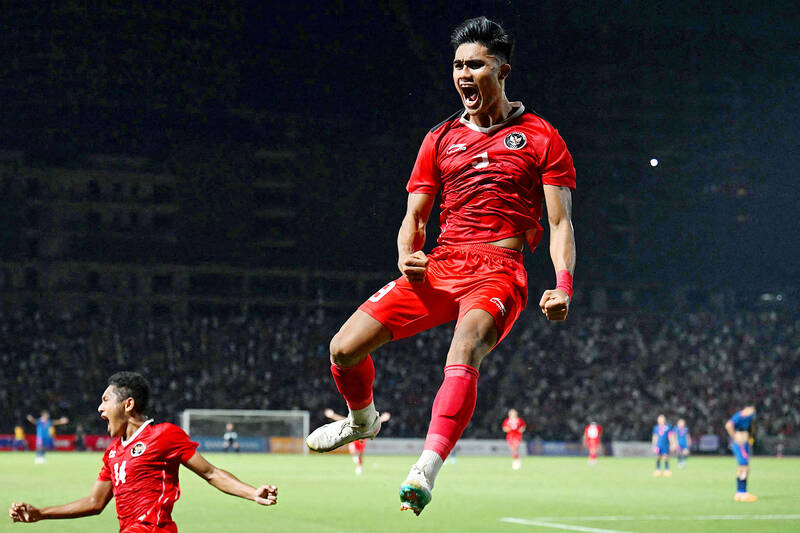The Asian Football Confederation (AFC) yesterday said that it was investigating “acts of violence” after two mass brawls and four red cards marred the men’s final of the Southeast Asian (SEA) Games.
Indonesia on Tuesday defeated Thailand 5-2 in extra-time in the Cambodian capital, Phnom Penh, in a match that saw clashes between players and coaches of both sides.
Thailand, who have since apologized and launched their own investigation, ended the bad-tempered final with eight players on the field.

Photo: AFP
One of those sent off was goalkeeper Soponwit Rakyart after he ran half the length of the pitch to deliver a diving punch to an Indonesian opponent.
“The AFC is disappointed with the disorderly incidents at the SEA Games football final,” a spokesperson for the governing body for soccer in Asia said.
“The AFC underlines the importance of fair play, mutual respect and sportsmanship, and takes a zero tolerance approach towards all such acts of violence, which threaten the physical integrity of players and officials,” they said.
Men’s soccer at the biennial SEA Games is played between under-23 sides.
The final had been billed as a chance for Indonesia to restore some pride following a deadly stadium disaster and the loss of hosting the FIFA U-20 World Cup.
However, the game would be remembered for the scenes that began in the 97th minute when Thailand — who had been 2-0 down — scored to make it 2-2 and force extra-time.
Thai officials celebrated their late leveler by running over to the Indonesia bench, prompting the first melee.
When Indonesia took the lead back early in extra-time, their officials returned the favor, with even more incendiary results.
Sumardji, a member of the team staff who like many Indonesians goes by one name, told TVOne that their players “returned the provocation and I chased them and shouted: ‘Don’t.’”
“But suddenly I got hit here [in the mouth] and I fell down,” he said.
Kicks were landed as well as punches. Both teams had a player sent off, and members of their coaching staff were also dismissed.
As the Thai team’s discipline crumbled, another two of their players were sent off during extra-time for second yellow cards.
The Football Association (FA) of Thailand said it would punish anyone found to have been in the wrong.
“The FA of Thailand must apologize for the clash on the touchline,” it said in a statement, adding it would “set up a committee to investigate those involved as soon as possible and will take decisive measures.”
The chairman of the Football Association of Indonesia pointed the finger at Thailand.
“Sometimes we got provoked and then we fell into it,” Erick Thohir told Metro TV.
“I warned earlier that this is a provocation, they wanted us to lose. We were beaten, trampled on and cheated,” he said.

Robinson Cano spent 17 seasons playing in the MLB in front of all kinds of baseball fans, but he said there is something special about his stint with the Mexican Baseball League’s Diablos Rojos. He is not alone. The league last week opened its 100th season, aiming to keep an impressive growth in attendance that began after the national team’s surprise run at the 2023 World Baseball Classic, and is already surpassing some first-division soccer clubs. After finishing third in the 2023 tournament, many casual fans, some of them soccer enthusiasts disappointed after Mexico were eliminated in the first round in the 2022

Noelvi Marte on Sunday had seven RBIs and hit his first career grand slam with a drive off infielder Jorge Mateo, while Austin Wynn had a career-high six RBIs as the Cincinnati Reds scored their most runs in 26 years in a 24-2 rout of the Baltimore Orioles. Marte finished with five hits, including his eighth-inning homer off Mateo. Wynn hit a three-run homer in the ninth off catcher Gary Sanchez. Cincinnati scored its most runs since a 24-12 win against the Colorado Rockies on May 19, 1999, and finished with 25 hits. Baltimore allowed its most runs since a 30-3 loss to

Arne Slot has denied that Darwin Nunez was dropped from Liverpool’s win against West Ham because of a training-ground row with a member of his coaching staff. The Liverpool head coach on Sunday last week said that Nunez was absent from the 2-1 victory at Anfield, having felt unwell during training the day before, although the striker sat behind the substitutes throughout the game. Speculation has been rife that the Uruguay international, whom Slot criticized for his work rate against Wolves and Aston Villa in February, was left out for disciplinary reasons. Asked on Friday to clarify the situation, Slot said: “He

CUNNINGHAM CONNECTS: In the Eastern Conference, the Pistons snapped their record 15-game playoff losing streak by beating the Knicks to level their series at 1-1 Kawhi Leonard on Monday scored 39 points on 15-of-19 shooting as the Los Angeles Clippers evened their first-round NBA Playoffs series against the Nuggets with a 105-102 win in Denver. “It feels like he didn’t miss a shot,” James Harden said. “His shot-making ability is elite.” Good thing, too, because his teammates were a combined 26 of 66 for a 39 percent clip. “I made shots tonight,” Leonard said. “I just keep playing, try to stay in the zone no matter if I’m making or missing shots.” The fifth-seeded Clippers needed every bit of his brilliance to snatch the homecourt advantage in the series